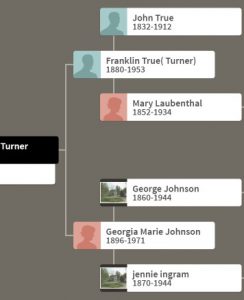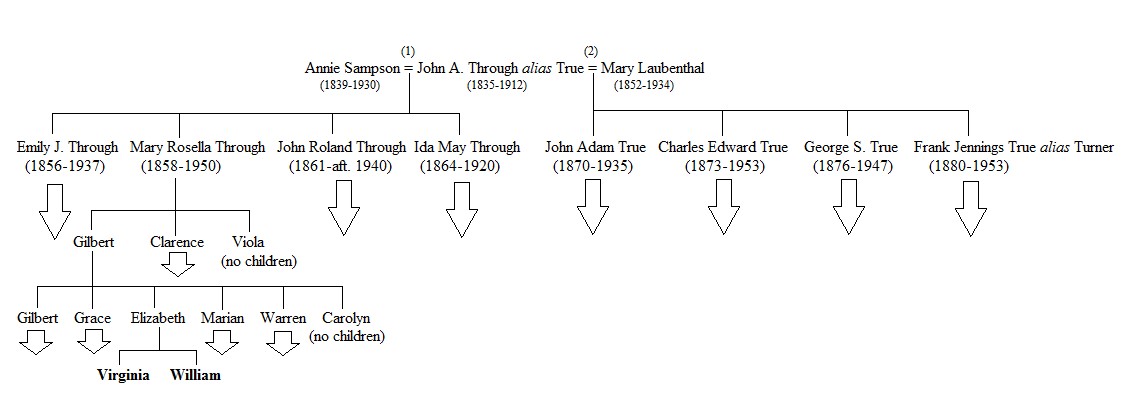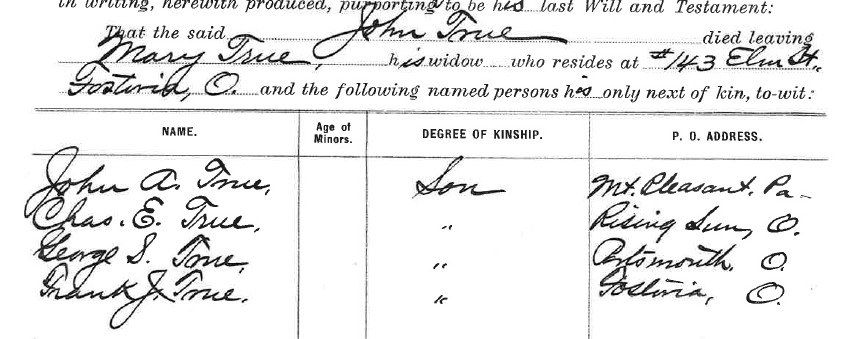 I have an entertaining update on my mysterious great-great-great-grandfather John A. Through alias True (1835–1912). In my recent post on this family, I discovered (with the help of DNA) his second later family, his slightly changed name, four additional children (a son John by each wife) – and wondered whether each of the four children he had by his two wives ever knew each other.
I have an entertaining update on my mysterious great-great-great-grandfather John A. Through alias True (1835–1912). In my recent post on this family, I discovered (with the help of DNA) his second later family, his slightly changed name, four additional children (a son John by each wife) – and wondered whether each of the four children he had by his two wives ever knew each other.
John A. True died at Fostoria, Ohio 14 January 1912 and in the index of Seneca County, Ohio Probate Records on Ancestry.com, I found that he did indeed leave a will. The year 1912 was just recent enough that I still had to write to the courthouse for copies, and I recently received John’s probate in the mail. By and large, this is a fairly ordinary probate for a person of moderate means. When it came to his will, he provided specifically for a grandson, Glenn N. True, the son of John’s son Frank True, and if that grandson died the specific bequest went to Glenn’s father Frank. John left his wife Mary all of the household furnishings. Then, when it came to the rest, he left the following item:
Interesting. My four children (unnamed). I think it’s fair to state the implication was the four children by his second wife, as they are listed later in a summary of heirs, as “his only next of kin, to-wit”:
Except this quartet is not his only next of kin. John had four other children by his first wife; in 1912, they were alive and well and living in Philadelphia. I think it’s also safe to assume that John’s two families did not know (much if anything about) each other.
[When] you encounter ancestors who may have secret, earlier, or later families, you should not expect their probate documents to be specific or make complete sense.
So, to the entertaining part of this. Since John left the rest of his property to his “four children” and did not name them, what does that mean from a legal standpoint? He actually had eight children. Had these four older children known of their estranged father’s death, could they have claimed something? I have no legal training, and am unfamiliar with the laws of Ohio in 1912, but let’s just have a little fun with this. Below is a chart outlining the descendants of John down to my father and his sister, indicating other children along the way who also have descendants.

The amount of John’s residuary estate was $1,525.75. If this is divided in equal eighths (rather than equal fourths), you get $190.71. From there divide this in two, then in fifths, and then again in half … and my father and his sister can each get a lovely inheritance of $9.53! (Adjusted for inflation, that’s $238.04, and who knows how much more if invested!)
Obviously all of this is absurd. I’m sure there are plenty of statutes of limitations for heirs filing such silly claims, but it does bring up the point that when you encounter ancestors who may have secret, earlier, or later families, you should not expect their probate documents to be specific or to make complete sense. Had John’s earlier children known of their estranged father’s death, this could have been an interesting court case. But the older children apparently did not know or did not care.
As one of my father’s three children, I still want my three dollars!


Ahh…..after 20 years of probate work in Maine. Ohio might have been different. Yes, the original four children could have challenged the Will, as filed, if they had known about it. These days, if you wish to exclude someone normally considered, you are encouraged to specifically state who you are excluding. Another interesting thought…..was he divorced from his first wife and if not, was he a bigamist ? If a bigamist, the second four children might not have “legally” been his children. And the Will could have been interpreted to meaning the first four. All in all, it pays to “cover your tracks” and write a really good Will.
Nancy – I’m not entirely sure whether John and his first wife divorced. His first wife had a child with her second husband in 1866 back in her native Baltimore. I’ve found some other entertaining clues that I need to follow up on.
Congratulations on adding to your family tree! You always have the most interesting family stories
Interesting!!! Much food for thought — and some hilarious scenarios! Seriously, this is intriguing. I have found name changes in some of my searches, but feel sure they were public knowledge and the name changer remained with his family. I will be more watchful.
Is there any record of a person dying and having a separate estate settlement for two different families he had?
Which made me wonder: how would one ever know?
Very interesting indeed. There are a lot of amazing stories that come out doing genealogy.
Does your family tree come down from the MA Child males who came into MA in the 1600’s or are you from the Child family- Henry who came bought land from William Penn and by 1700 had moved himself & children (wife Ann Ball died in England) to PA, then moved to Maryland because it was not safe to live in Plumstead Co. PA at that time? The name changed in our line around 1810-30 in PA via documents of Richard CHILDS. This is my husbands line of descent.
Hi line goes back to Benjamin Child, who arrived in the 1640s and settled in Roxbury, Massachusetts. His uncle Ephraim Child came in 1630 with the Winthrop Fleet and lived in Watertown. He made a return trip to England and brought back several kinsman. This blog post discusses my Child lines -http://vita-brevis.org/2015/08/the-names-the-same/
Henry Child of Pennsylvania is an ancestor of grandfather’s step-siblings (my great-grandfather’s second wife of was Child widow, but not related).
Awesome post Chris! Hey, if you are owed this money with interest I say we collect it. I am sure game to call the probate court and see. (Well maybe?) Besides, I owe you. If it weren’t for you I’d have never learned about my 100 acres of Vermont woodlands due my 6x great grandmother Lydia Swift Young! 🙂
Good stuff Chris!
Thanks Jeff, the woodlands in Vermont sound more appealing to me!
Great post! Families are always more complicated than they seem.
I have a similar story with my great grandfather George Gardner Booth (1871-1957). He married my great-grandmother Bertha Isabel Barton (1875-1957) on 25 July 1894. They had 4 children together, and sometime around 1929, he “ran off with another woman” and never looked back. My grandmother (their youngest) was about 15-16 years old at the time and it broke her heart. She never knew what had happened to him until I tracked it down. Come to find out, he lived in Boston about 20 minutes away from the family in Malden, MA for quite a long time before he retired to Florida to live near his brother in St. Petersburg. I found his death record and obituary, and it only mentioned his “wife” (not my great-grandmother!) I have not been able to get his probate or will, but I heard that my grandmother’s older sister had “kept tabs” on their father, and she fought for the estate since he never divorced my great-grandmother. So, I have to wonder if he ever married “the other woman” or not? I would love to get my hands on that probate! I haven’t tried in years, so your article has inspired me to look again. Thank you!
Wonderful, amusing post, Chris. I reread your first post along with this one. I have a gg grandfather named Bastion, which gives too many hits.
Recently a relative’s family DNA turned up two big family secrets. The grandmother had some of her children with another man after her husband left, so they’re actually half siblings. One of those children had a child out of wedlock, whom he gave up for adoption. The family just made contact with her, which thrills her and some of her new family, but is giving her biological father and his other children a lot to deal with. I’ve got a new 3rd cousin out of this, but haven’t quite figured out how it affects the rest of the family tree.
Doris